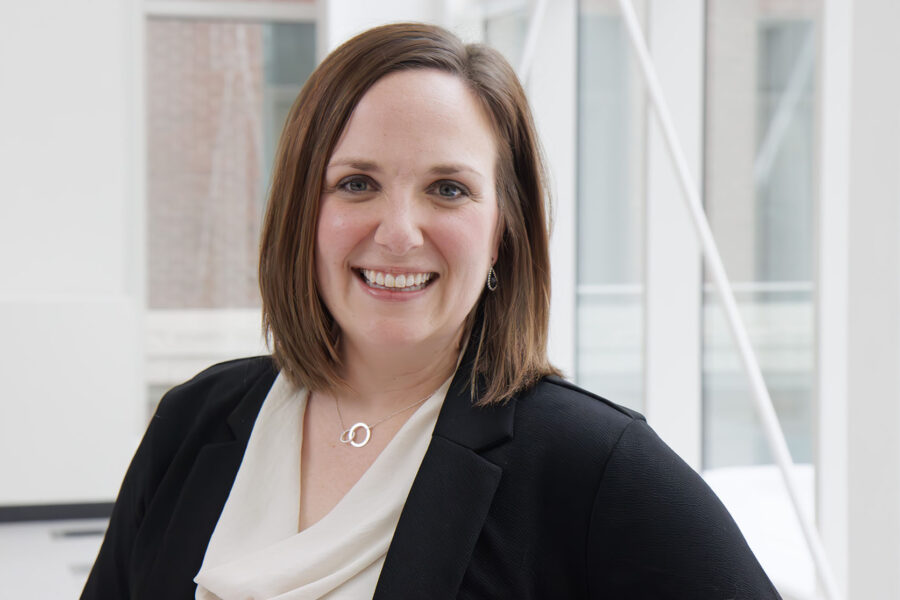The University of Nebraska Medical Center boasts a formidable cohort of women who drive scientific exploration and advance modern medicine in Nebraska and beyond. These visionary researchers and innovators are propelled by grit, resilience and personal resolve to “find a better way.” Among them: Beth Beam, PhD; Rebekah Gundry, PhD; Breanna Hetland, PhD; and Hongying “Daisy” Dai, PhD.
Serendipity, Integrated Care & Robotic Seals
Registered nurse scientist Breanna Hetland, PhD, pushes the boundaries of traditional nursing practice, driven by a deep-seeded desire to “humanize” hospitalization.
A native of Illinois, she joined the UNMC College of Nursing as an assistant professor in 2017 – fresh off a postdoctoral fellowship in symptom management and palliative care research in adults with advanced disease at Case Western Reserve’s Frances Payne Bolton School of Nursing in Cleveland, Ohio.
The fellowship, sponsored by the National Institute of Nursing Research, solidified Dr. Hetland’s determination to enhance the patient-family experience in the intensive care unit. Her father’s brainstem stroke in 2013 would further emphasize the significance of integrating loved ones into the health care team.
As an ICU nurse, Dr. Hetland understood the challenges faced by patients and their families during acute hospitalization, guiding them through the most traumatic experience of their lives. However, the experience felt totally different when the tables were turned, and she was the family member in the ICU.
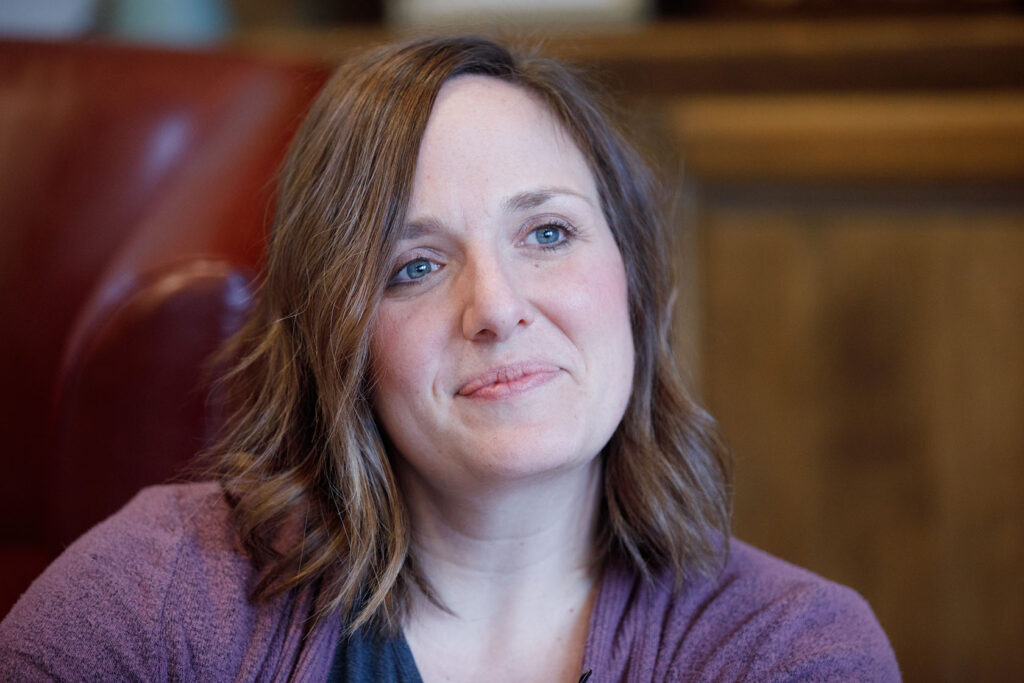
As a result, Dr. Hetland and a group of bedside nurses created the first version of the Family Room, an app to empower families to play an active role in day-to-day caregiving and decision-making during an acute hospitalization. The digital resource is designed to enhance outcomes, reduce health-care costs and mark a significant step toward holistic healing within the health-care system.
After a rush of research funding and a serendipitous partnership with an invested co-founder, Greg Nelson, the business (familyroom.health) and latest version of the app are nearly ready to meet the world – capping a collaboration since 2018 with UNMC’s technology transfer office, UNeMed, and Nebraska’s startup incubator and accelerator, UNeTech.
“The app is just the beginning of our vision,” Dr. Hetland said. One feature she especially likes is the comprehensive virtual tour of the hospital environment that provides insights into equipment, sounds and procedures. Family caregivers also can communicate real-time observations to clinicians.
“On average, it takes 17 years to turn research into practice. Remarkably, we did it with our prototype in just under six months.”
•••
For Dr. Hetland, nursing has always been about providing compassionate care: From saving a featherless baby sparrow as a youngster, to exploring STEM careers as a teen, to pivoting from pre-med to nursing at Southern Illinois University Edwardsville and, finally, to innovating in health care.
Who knows where she would be today if she hadn’t boosted her ACT test score by four points, securing a full-ride, four-year Meridian Scholarship to SIUE? “It’s the greatest gift I’ve ever received,” she said, emphasizing that she’s now paying forward the generosity to her alma mater.
During her college years, she embarked on a “life-changing” 16-week cultural immersion in China and Tibet, where she delved into the study of holistic health and healing.
As a senior, she heeded her mentor’s advice and joined an undergraduate research program, where she excelled.
Additionally, she had a “very intense” Mayo Clinic internship, where she discovered her passion for critical care nursing in a transplant ICU. During this time, she also conducted a small descriptive study on student opinions of holistic healing.
Despite faculty encouragement, Dr. Hetland initially passed on a fast-track BSN-to-PhD degree and returned after graduation to her hometown of Bartonville, Illinois, to work in a medical ICU.
“I loved interacting with patients and families, yet I found myself constantly questioning the rationale behind certain procedures,” she said. “I couldn’t let go of my need to understand the ‘why’ behind everything.” After just 10 months in her first job as a clinical nurse, she changed course to pursue a PhD.
During doctoral studies at the University of Minnesota, Dr. Hetland worked under Linda Chlan, PhD, who was studying the effects of music therapy on ventilated patients in the ICU.
Concurrently, Dr. Hetland began examining the holistic needs of individuals experiencing acute crisis.
“In the ICU, we focus on saving patients physically, but we frequently overlook their emotional and psychological needs,” she said.
•••
Dr. Hetland, alongside husband Tyler, remains steadfast in a mostly work-from-home routine that blends structure with flexibility.
“My children have made me a better scientist,” she said of Layla, 5, and Tully, 22 months, with another child expected in August.
The day of this interview, the girls had an opportunity to interact with one of Mom’s research assistants – Paro, a robotic baby harp seal. Currently undergoing trials with UNMC’s clinical partners Nebraska Medicine and Children’s Nebraska, the therapeutic seal is earning high marks in the pediatric ICU.
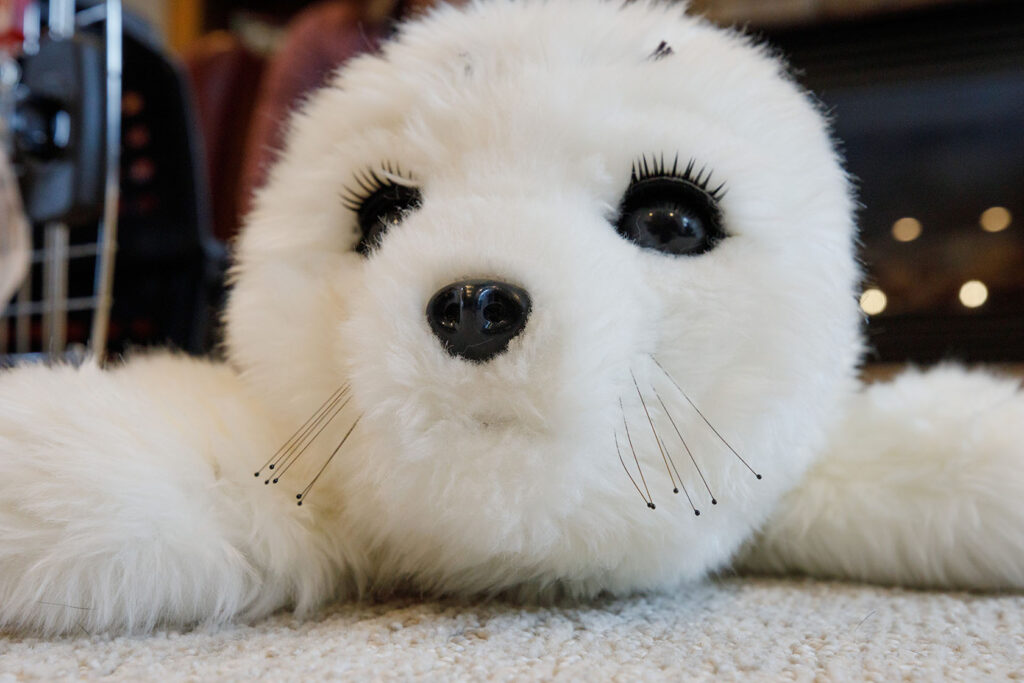
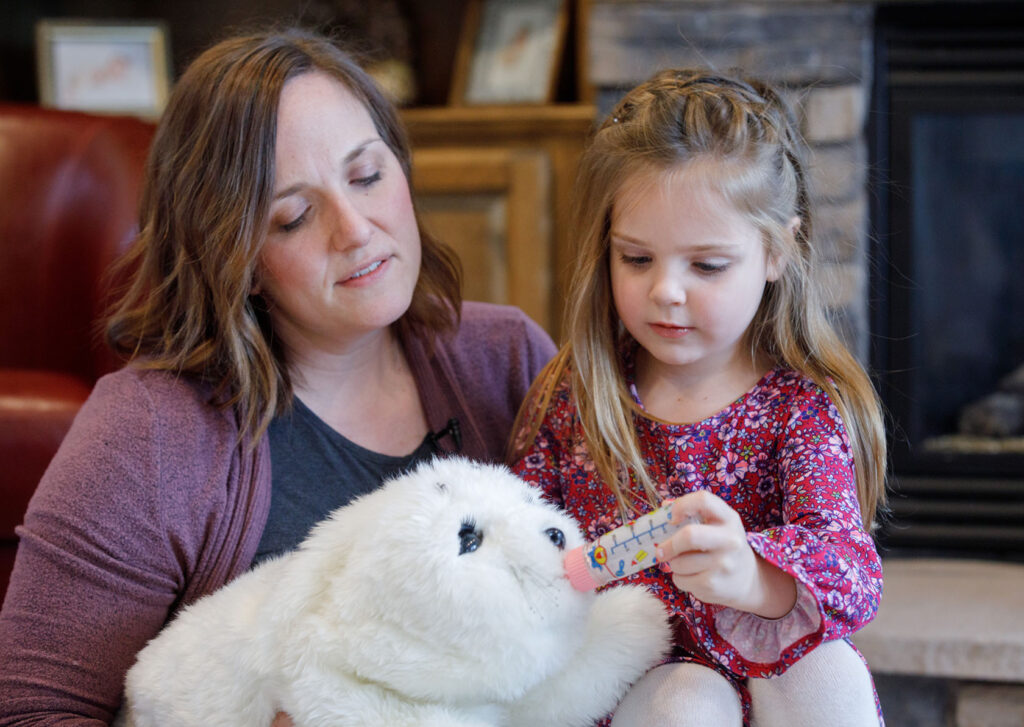
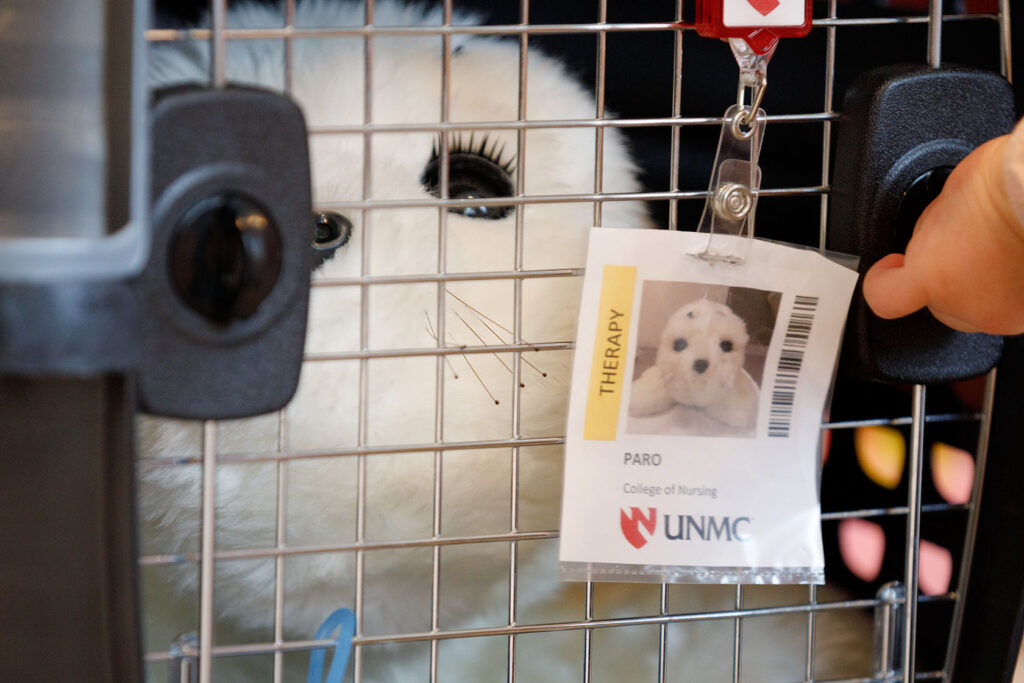
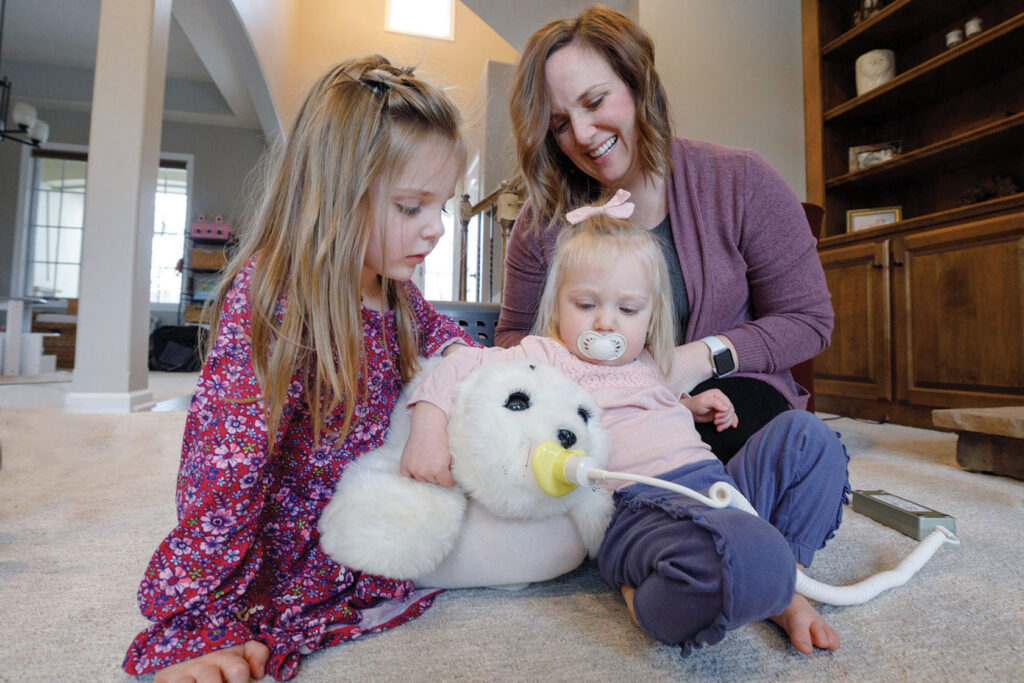
During her postgraduate studies, Dr. Hetland found a partner in holistic acute care in Buddy, a chocolate Labrador retriever she rescued heading into her postgraduate studies. “Our job was to help families through this incredible crisis,” she said.
Thanks to Dr. Hetland’s critical care expertise, she and Buddy were often granted access to clinical areas rarely visited by animals. Over the span of four years, they dedicated more than 200 service hours together.
Even after the Hetlands relocated to Omaha, Buddy remained a loyal companion. In a cherished photo, he is shown snuggling with newborn Layla, just a few months before he died.
Buddy’s impact on patients and families inspired Dr. Hetland to explore innovative ways of integrating animals into the ICU. Her search led to Paro, developed by AIST, a Japanese firm specializing in automations. Building on Paro’s potential, Dr. Hetland pursued funding from the Pediatric Cancer Research Group for a collaborative clinical trial with Nebraska Medicine and the Fred & Pamela Buffett Cancer Center.
Click the Play button to hear Dr. Hetland share insights into the use of a robotic baby harp seal in the pediatric ICU, captivating hearts and delivering therapeutic benefits.
Click here and here for more videos on Dr. Hetland’s research into the therapeutic use of robotic baby harp seals.
Within three years, Children’s Nebraska initiated a second clinical trial featuring a trio of baby harp seals — Paro, Pepé Le Pew and Pickles. These seals actively participate in physical, occupational and speech therapy sessions, contributing to personalized therapeutic interventions.
“This kind of research fills my cup,” Dr. Hetland said. “What began as a side project with Buddy has evolved into a groundbreaking interdisciplinary collaboration. Our work is far from over. The possibilities are limitless.”
•••
In May 2023, Dr. Hetland was named to a prestigious national fellowship program for innovative nursing leaders. As the fourth cohort of the Betty Irene Moore Fellowship for Nurse Leaders and Innovators through the University of California-Davis nursing school, Dr. Hetland received a $500,000 grant to effectively roll out and commercialize the Family Room app.
Dr. Hetland’s groundbreaking work has garnered more recognition in recent months, including acceptance into a selective entrepreneur-mentoring program and a Harriet H. Werley New Investigator Award from the Midwest Nursing Research Society.
In 2023, she was accepted into a competitive national entrepreneur- mentoring program, further propelling her efforts to revolutionize intensive care units worldwide.
Her advice to her younger self?
“Follow the brush,” she said, elaborating: “Just follow the stroke that’s in front of you. Lean into the unknown and trust your instincts. You can always fix your brushstrokes as you go.”
And seize those serendipitous moments, she said. “My life has been filled with them.”
